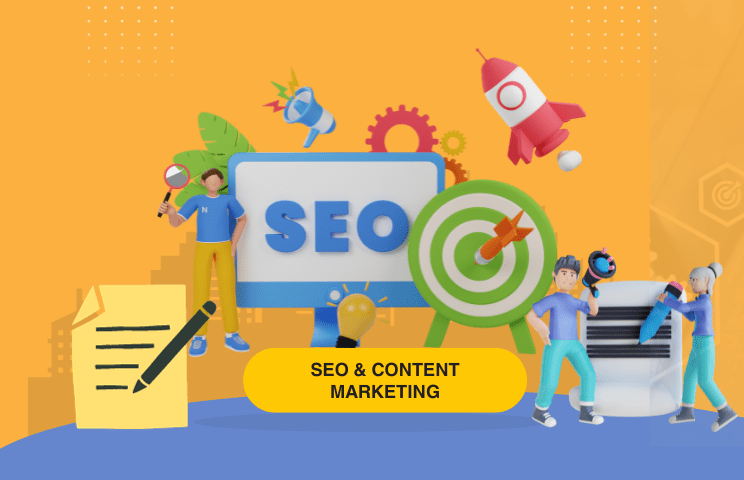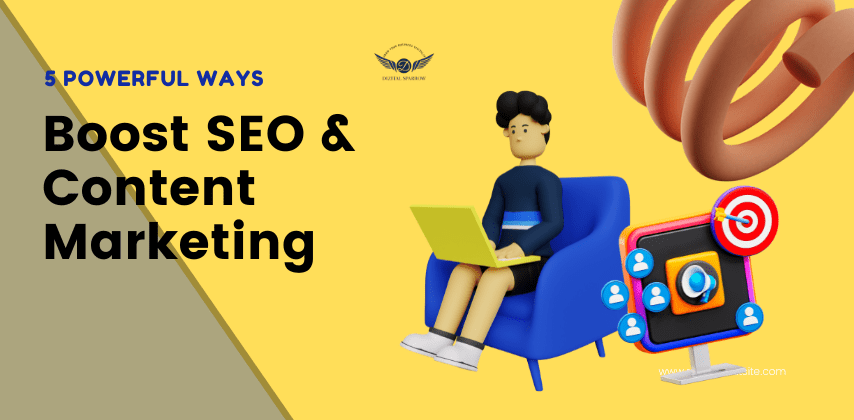Introduction
In today’s digital age, search engine optimization (SEO) and content marketing are two essential components of any successful online strategy. Marketers are constantly seeking innovative ways to improve their rankings on search engines and engage their target audience effectively. Enter artificial intelligence (AI), a game-changing technology that has revolutionized the world of digital marketing. In this article, we will explore five powerful ways marketers are leveraging AI to supercharge their SEO and content marketing efforts.
1. Content Generation.
Artificial intelligence (AI)-enabled content generating has emerged as a transformational force in the field of digital marketing. This technique involves AI algorithms, such as GPT-3, creating written, visual, or audio content by analysing massive datasets to generate human-like content
.
AI-powered content generating has various advantages. First and foremost, it saves businesses and content providers important time and resources. AI can generate high-quality articles, blog entries, and product descriptions in seconds rather than hours of ideation and writing. This efficiency enables marketers to focus on strategy and creativity while providing fresh material to their audience on a constant basis.
AI-generated content is also versatile and scalable. It may cater to a wide range of niches and sectors while yet keeping the material relevant and compelling. AI may help optimise content for SEO by recommending keywords, meta tags, and content architectures that increase search engine ranks.
However, striking a balance between automation and human touch is critical. While AI can effectively generate content, human control is required to maintain quality, assure brand voice consistency, and inject originality into the material. To summarise, AI-powered content generation is a game changer that speeds content production, improves SEO efforts, and frees up human resources for more strategic activities.
you may also like-https://digitalsparrow.co/content-marketing-b2b-b2c-growth/
2. Keyword Research and Optimization
Keyword research and optimization are pivotal components of successful search engine optimization (SEO) strategies. In the digital landscape, where visibility on search engines is paramount, harnessing the power of artificial intelligence (AI) has become a game-changer.
AI-driven tools excel at keyword research by analyzing vast amounts of data and user behavior patterns. They identify high-impact keywords relevant to a specific industry or topic, providing marketers with valuable insights to shape their content strategies. These tools go beyond basic keyword suggestions, delving into long-tail keywords and semantic search to optimize content comprehensively.
AI doesn’t stop at research; it also aids in keyword optimization. By analyzing on-page elements, content structure, and user intent, AI algorithms can recommend improvements. This ensures that content aligns with search engine algorithms and offers real value to human readers, striking the delicate balance that modern SEO demands.
Furthermore, AI constantly adapts to developing search engine algorithms, assisting businesses in staying ahead of the competition in the SEO field. It enables dynamic keyword strategy revisions based on real-time data, giving a competitive advantage.
AI improves accuracy, efficiency, and adaptability in keyword research and optimisation. Marketers who use AI in this sector can create more successful SEO strategies, improve organic search traffic, and achieve more exposure in an increasingly competitive digital marketplace.
3. Content Personalization.
Content personalization is a dynamic approach to delivering tailored content to individuals based on their preferences, behavior, and demographics. In today’s digital age, where consumers are inundated with information, content personalization powered by artificial intelligence (AI) has become a critical strategy for engaging and retaining audiences.
AI-driven personalization begins with data collection and analysis. It gathers information about user behavior, such as website visits, click-through rates, past purchases, and even demographic details. This data is then processed to create user profiles and insights, allowing marketers to understand their audience better.
AI algorithms can utilise these insights to propose or serve content that is relevant to each user’s interests and needs. An e-commerce platform, for example, might propose things based on a user’s previous purchases, whereas a news website might recommend stories based on the user’s reading history.
Personalization of content improves the user experience by offering relevant material, improving engagement, and eventually increasing conversion rates. It contributes to the development of stronger client relationships by exhibiting an awareness of individual preferences.
5 Powerful Ways Marketers Are Using AI To Boost SEO & Content Marketing
However, striking a balance between personalisation and privacy is critical, as is ensuring that data is acquired and handled responsibly and transparently. When done correctly, content personalisation is a potent tool for increasing consumer pleasure, loyalty, and corporate growth in the digital age.

4. Natural Language Processing (NLP)
Natural Language Processing (NLP) is a subfield of artificial intelligence (AI) that focuses on enabling robots to perceive, interpret, and synthesise human language. It is critical in bridging the gap between human communication and machine understanding. NLP algorithms are designed to interpret and analyse text and speech input, allowing machines to engage with people in a more natural and understandable manner.
NLP encompasses a wide range of applications, including.
Sentiment Analysis: NLP can determine the sentiment (positive, negative, or neutral) expressed in text data, which is invaluable for businesses to gauge customer opinions and adjust strategies accordingly.
Chatbots and Virtual Assistants: NLP powers chatbots and virtual assistants that can engage in natural conversations with users, answer questions, and provide assistance across various industries, from customer support to healthcare.
Language Translation: NLP has revolutionized language translation services, making it easier for people to communicate across language barriers.
Information Extraction: NLP can extract specific information from unstructured text, such as extracting dates, names, or addresses from documents.
Content Summarization: NLP algorithms can summarize long pieces of text, making it easier for users to grasp the main points quickly.
Search Engines: Search engines like Google use NLP to better understand user queries and provide more relevant search results.
While NLP has made great progress, it still confronts issues such as dealing with ambiguity and context in language, assuring fairness and bias reduction, and dealing with languages with limited resources. Nonetheless, NLP is evolving and has enormous potential to improve a wide range of elements of our life, from communication to decision-making processes.
5. Predictive Analytics.
A data-driven strategy called predictive analytics uses statistical algorithms, machine learning, historical and present data, and other factors to predict future events or trends. It is essential to many different businesses because it gives organisations the power to make well-informed decisions and accurately predict what will happen in the future.
Predictive analytics often involves multiple crucial processes, including.
Data Collection: The process begins with the collection of relevant data, which can include historical records, customer interactions, financial transactions, sensor data, and more. High-quality and diverse data are essential for building effective predictive models.
Data Preprocessing: Raw data often requires cleaning, transformation, and normalization to ensure accuracy and consistency. This step is crucial for preparing the data for analysis.
Model Development: Machine learning algorithms are applied to the preprocessed data to build predictive models. These models learn from past data patterns and relationships to make predictions about future events, behaviors, or outcomes.
Model Evaluation: Predictive models are rigorously tested using historical data to assess their accuracy and reliability. Various metrics and validation techniques are employed to ensure the models’ effectiveness.
Deployment: Once validated, predictive models can be integrated into business processes and systems to provide real-time predictions and inform decision-making. This deployment can be seen in various applications, such as fraud detection, recommendation systems, supply chain optimization, and healthcare outcomes prediction.
Making data-driven decisions, allocating resources optimally, lowering risks, and improving customer experiences are all made possible by predictive analytics, giving organisations a competitive edge. Businesses are becoming more aware of its potential to provide insightful data and fuel success in a world that is becoming more data-driven, which is why its diverse uses are expanding.
Why is Content marketing important –https://startupadvice.in/why-is-content-marketing-important-for-local-businesses/
Conclusion
Artificial intelligence is a powerful tool that has transformed the way marketers approach SEO and content marketing. From automating content generation to enhancing personalization and predictive analytics, AI is reshaping the digital marketing landscape. Marketers who embrace these AI-powered techniques are well-positioned to stay competitive in an ever-evolving online ecosystem. As AI continues to advance, we can expect even more innovative ways to boost SEO and content marketing, driving better results and delivering more value to both businesses and consumers.


I don’t think the title of your article matches the content lol. Just kidding, mainly because I had some doubts after reading the article.